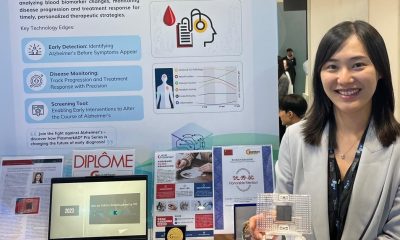News
Study wins €12 million ERC grant to unlock secrets of healthy ageing

Researchers at University College Dublin (UCD), have won a €12 million European Research Council (ERC) Synergy grant, to explore whether bats could hold the secret to health and longevity.
The ERC Synergy grants support ambitious researchers to join forces and pool different skills, knowledge and resources to push the frontiers of our knowledge and address some of the world’s most formidable problems.
The groundbreaking Synergy project ’BATPROTECT’, involving a team of 22 researchers – including leading experts from Germany and Singapore, is expected to achieve a step-change in our understanding of bats’ extended healthspan and disease resistance.
While previous research has struggled to offer solutions to increase human health span and protect against the harmful effects of infections, bats – the only flying mammals – have naturally addressed both of these problems.
Even though bats serve as hosts for numerous dangerous viruses, they usually don’t show symptoms of viral infections thanks to their unique immune system adaptations. Bats also have exceptional longevity and show little-to-no signs of any age related diseases.
The main objective of BATPROTECT is to make significant advancements in our understanding of the specific genetic and biochemical factors within bats that are responsible for their ability to live longer, healthier lives and resist diseases.
Uncovering these molecular mechanisms could open up new possibilities for improving human health and disease outcomes.
The project brings together world-leading researchers in bat biology, genomics, immunology, and gerontology. The team’s experts include Professor Linfa Wang, Duke-NUS Medical School, Singapore, Professor Michael Hiller, Senckenberg Research Institute, Germany, and Professor Björn Schumacher, Institute for Genome Stability in Ageing and Disease, CECAD Research Centre, Germany.
Lead researcher, Professor Emma Teeling, Full Professor of Zoology, has pioneered global research into the development of bats as new models for healthy ageing and disease tolerance.
Professor Teeling said: “We have just been given the most extraordinary opportunity to finally harness the amazing adaptations of bats and provide new ways to slow down human ageing and disease resistance. This ERC Synergy grant has enabled us to unite the fields of bat biology, virology, immunology, genomics and gerontology, across Europe and Asia, in order to achieve our goals.
“We are thrilled and excited to work together and uncover how we can live longer, healthier lives by learning from bats. I would like to thank the Irish Research Council and Science Foundation Ireland for initially funding this research and Enterprise Ireland for their support.”
Empowering research
In total, 37 research groups across Europe were announced as recipients of 2023 ERC Synergy grants – with a total value of €359 million – to tackle complex scientific questions.
Recipients include fellow UCD researcher Dr Claire Harnett, whose project ‘ROTTnROCK’ will advance knowledge of volcanic processes to help predict and mitigate the hazards of unexpected eruptions.
UCD Interim Vice-President for Research, Innovation and Impact, Professor Helen Roche, said: “We are immensely proud of Professor Teeling and Dr Harnett in their achievement. UCD is ranked number one in Ireland and 23rd among higher education institutions in Europe for Horizon Europe funding. These awards really exemplify the excellence of our outstanding researchers, who are building important international collaborations to address global challenges. I congratulate the winners and look forward to following their exciting work.”
Iliana Ivanova, ERC Commissioner for Innovation, Research, Culture, Education and Youth, said: “Some scientific questions are too complex to be addressed by researchers working on their own. Challenges such as climate change or ageing span research disciplines and call for diverse methods, skills and resources.
“This is why the European Research Council today awarded 37 Synergy Grants, empowering small groups of top researchers working across disciplines to tackle serious problems. I wish them success in this important work.”
Research
Scientists discover new anti-ageing drug class that could extend lifespan

Scientists have identified a new anti-ageing drug class that acts on gut bacteria processes, offering potential new ways to extend human lifespan.
The drugs target the Target of Rapamycin (TOR) pathway — a system in humans and other species that regulates growth and ageing and plays a central role in age-related diseases such as cancer and dementia.
The discovery helps explain how drugs can influence longevity through this pathway, which is already a major focus in ageing and cancer research.
Existing drugs such as rapamycin have shown promise in extending healthy lifespan in animals.
Researchers from Queen Mary University of London tested a next-generation drug called Rapalink-1, which inhibits TOR and is being investigated for its anti-cancer properties.
They found that Rapalink-1 not only slowed yeast cell growth but also extended lifespan, acting through the TORC1 cluster of proteins — part of the growth-promoting arm of the TOR pathway.
The study also identified a key role for gut bacteria enzymes known as agmatinases, which break down agmatine — a compound produced from the amino acid arginine — and help keep TOR activity in check.
Previous research has shown that when these enzymes lose function, cells grow faster and age prematurely.
Studies have also indicated that compounds linked to this pathway can promote longevity and benefit cells.
“By showing that agmatinases are essential for healthy ageing, we’ve uncovered a new layer of metabolic control over TOR – one that may be conserved in humans,” said Charalampos Rallis, an author of the study.
“Because agmatine is produced by diet and gut microbes, this work may help explain how nutrition and the microbiome influence ageing.”
Although agmatine supplements are already available commercially, scientists caution against taking them for growth or longevity without medical supervision.
The research suggests agmatine may be beneficial only when certain metabolic pathways related to arginine breakdown are functioning properly.
“In addition, agmatine does not always promote beneficial effects as it can contribute to certain pathologies,” Dr Rallis said.
News
Half of Brits fear dementia more than any other condition, research finds

Half of UK adults fear dementia more than any other health condition, with women and over-65s the most likely to share this concern, new research shows.
The figures come from the latest Dementia Attitudes Monitor, a biennial survey of more than 2,000 people that tracks how the public thinks and feels about dementia.
It explores what people believe raises their risk, how likely they are to seek a diagnosis, and their views on how effective treatments are.
Now in its fourth wave since launching in 2018, the survey was commissioned by Alzheimer’s Research UK and shows that fear remains high as dementia continues to be the UK’s leading cause of death.
Hilary Evans-Newton is chief executive of Alzheimer’s Research UK.
She said: “People fear dementia because there is still no cure. Dementia continues to rob people of their independence and place an immense strain on families and society.
“By 2040, 1.4 million people in the UK are expected to be living with dementia, making progress more urgent than ever.”
While 59 per cent of UK adults say they would feel comfortable discussing a diagnosis, stigma remains a major barrier, particularly among minority ethnic communities.
Among Black African, Black Caribbean and Black British adults, this drops to 46 per cent, with more than a third (35 per cent) saying they would not feel comfortable — compared with 23 per cent of white respondents.
Views also vary by age.
Nine in ten people aged 35–64 said they would likely seek a diagnosis if they were worried about early-stage Alzheimer’s or another form of dementia.
Among adults aged 65 and over, this falls slightly to eight in ten.
Older adults are twice as likely to say they wouldn’t seek a diagnosis: seven per cent of those aged 35–64 said they probably wouldn’t speak to a doctor, compared with 14 per cent of people aged 65 and over.
Alzheimer’s Research UK is tackling stigma through its Dementia Community Champions programme, which supports volunteers to start conversations about dementia, stigma and research within their own communities.
Emily Allen, a supporter of the charity whose mother was diagnosed with young-onset Alzheimer’s in 2010, shared her experience.
She said: “When mum was first diagnosed, I didn’t know much about dementia.
“I remember searching the internet for any information I could find about Alzheimer’s.
“I couldn’t comprehend the thought of mum not knowing my name, not knowing who I am. It was terrifying.
“When I discussed it with my sisters, we would call it the ‘Big A’ as we couldn’t bring ourselves to say the word.
“I think there is more understanding among the public about dementia now.
“But there is still so much fear because of how it affects people and their families, and because there are so few effective treatments available.”
When asked to choose the top priorities for dementia research from a list of eight, 43 per cent of respondents selected finding a cure as the most or second-most important goal, followed closely by prevention.
Since the previous wave of the monitor in 2023, two new treatments — lecanemab and donanemab — have been licensed in the UK (2024).
Although not yet available on the NHS, they mark a significant milestone in research and may explain why the public continues to prioritise a cure.
News
Weight loss jabs could make cancer scans less effective, study suggests

Weight loss jabs such as Mounjaro and Wegovy could make some cancer scans less effective, leading to unnecessary tests and possible delays in treatment, experts suggest.
The drugs, collectively known as GLP-1s, have helped millions lose up to a fifth of their body weight but may alter how tissue appears on PET-CT scans used to diagnose and stage cancers.
The changes could cause healthy tissue to be misinterpreted as potentially cancerous, meaning some patients may face extra investigations and anxiety while awaiting results.
British researchers at Alliance Medical, a leading provider of diagnostic imaging in the UK, identified the issue after noticing unusual patterns in patient scans.
PET-CT scans combine CT and PET imaging, using a mildly radioactive liquid called a tracer to highlight areas where cells are more active than normal. Brighter spots can indicate cancer, though they may also reflect infections or inflammation.
“We noticed unusual uptake in one of our patients on a GLP-1 agonist, which prompted a wider review across our network,” said Dr Peter Strouhal, medical director at Alliance Medical and lead author of the study.
“We found that these altered patterns are increasingly common, yet there is currently no national or international guidance in the UK addressing this emerging issue.”
The review of several PET-CT scans found atypical tracer patterns among GLP-1 users that “could be misinterpreted” as hot spots or potentially cancerous areas.
“Recognising the characteristic uptake associated with GLP-1 agonists helps avoid unnecessary anxiety and interventions, ensuring patients receive the right care, at the right time, without detours or doubt,” Dr Strouhal said.
Researchers said larger studies involving more data are needed before recommendations can be made to change PET-CT scan guidelines for weight loss jab users.
They advised clinicians to consider a patient’s medical history when interpreting results.
It follows earlier US research suggesting GLP-1 drugs could interfere with breast-cancer chemotherapy medicines.
That study tracked hundreds of women with early-stage triple-negative breast cancer during and after treatment.
Twenty-five were already taking GLP-1s alongside other diabetes drugs and continued doing so while undergoing chemotherapy.
Two years later, 28 per cent of the women on GLP-1s had fully responded to treatment and were clear of cancer, compared with 63 per cent of those not using the drugs.
Researchers also found GLP-1s had entered tumour and immune cells in tissue samples from the patients.
“Use of GLP-1 use may need to be carefully considered during breast cancer therapy,” said Dr Bethania Santos, oncologist and researcher at UT Southwestern Medical Center in Dallas, who presented the study at the San Antonio Breast Cancer Symposium.
However, experts at the time said the drugs themselves may not have reduced the effectiveness of chemotherapy.
People with advanced diabetes who require several medicines already have a higher risk of breast-cancer recurrence.
The study did not prove whether weight-loss drugs help or hinder the success of cancer therapy.

 News2 months ago
News2 months agoInterview: How AI-driven blood test could speed Alzheimer’s diagnosis

 News1 month ago
News1 month agoOdds of dementia strongly linked to number of co-existing mental illnesses, study finds

 News4 days ago
News4 days agoWeight loss jabs could make cancer scans less effective, study suggests

 Research2 months ago
Research2 months agoLong Covid causes effects similar to Parkinson’s or stroke, research reveals

 News3 weeks ago
News3 weeks agoExercise may lower dementia risk, study suggests

 News1 month ago
News1 month agoSweeteners could age the brain by 1.6 years, research suggests

 News2 weeks ago
News2 weeks agoEarly diagnosis can improve ‘dementia journey’, charity says

 News2 months ago
News2 months agoHand wringing may signal advanced dementia





































